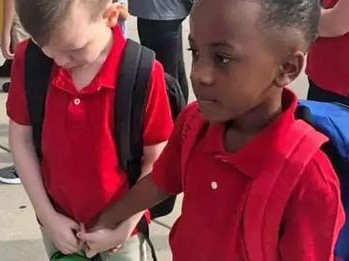The first day of school is often a whirlwind of excitement and nerves for kids and parents alike. For children with Autism Spectrum Disorder (ASD), it can be particularly overwhelming. This was the case for Connor Crites, an 8-year-old boy with autism, who faced the chaos of the first day at Minneha Elementary School. However, an unexpected act of kindness turned a daunting moment into a heartwarming story that touched thousands.
Understanding Autism and the Challenges of Social Settings

People with Autism Spectrum Disorder (ASD) often perceive the world differently. Social settings, especially those filled with noise, new faces, and unfamiliar routines, can feel overwhelming. This sensory overload can trigger stress and anxiety, as it did for Connor on that first day. Instead of mingling with classmates, he sought solace by curling up in a corner, tears streaming down his face.
Connor’s mother, April Crites, expressed her constant concern about how others might perceive her son. “I fear every day that someone is going to laugh at him because he doesn’t speak correctly or sit still,” she said. This fear is a common reality for many parents of children with ASD. But on this particular day, Connor found an unexpected ally.
The Power of a Simple Gesture: Christian Moore Steps In
While many children might not know how to react to a peer in distress, Christian Moore, a fellow second-grader, displayed remarkable empathy. Christian noticed Connor crying and without hesitation, walked over to console him. What he did next melted hearts everywhere—he took Connor’s hand and guided him inside the school.
Christian’s mother, Courtney Moore, captured the touching moment in a photograph. “I saw him on the ground with Connor, comforting him. Then he grabbed his hand and walked him to the front door. The rest is history,” Courtney shared. The two boys formed an instant, unbreakable bond.
Why Kindness Matters: Lessons from Christian’s Gesture
Christian’s actions resonated deeply because they remind us of the importance of compassion and inclusion. His mother later posted the story and photo on Facebook, where it quickly went viral, amassing over 30,000 likes and 20,000 shares.
In her post, Courtney praised her son’s big heart: “I’m so proud of my son. He saw a kid crying, went to console him, grabbed his hand, and walked him inside. It’s an honor to raise such a loving, compassionate child.”
This moment wasn’t just a win for Connor—it was a teaching moment for everyone. Christian didn’t see Connor as different; he simply saw someone in need of comfort.
The Impact of Inclusion on Children with Autism
For children like Connor, small acts of kindness can have a profound impact. Feeling accepted and supported in a potentially stressful environment can boost their confidence and help them navigate challenges. Connor later shared how Christian’s actions made him feel: “He was kind to me. It was the first day of school, and I started crying. He helped me, and I was happy.”
Christian’s empathy demonstrates that kids naturally possess the capacity for inclusion when guided by compassion. It’s a reminder for parents, teachers, and communities to foster an environment where acts of kindness are celebrated and encouraged.
What Parents and Schools Can Learn

This story highlights the need for schools to promote inclusivity and educate students about empathy and diversity. Here are some key takeaways:
- Teach Empathy Early: Schools and parents should encourage children to recognize and respond to the needs of their peers.
- Create Safe Spaces: Provide quiet zones or sensory-friendly areas where children with autism can decompress when feeling overwhelmed.
- Celebrate Differences: Incorporate lessons and activities that help students understand and appreciate neurodiversity.
Connor’s and Christian’s story serves as a beautiful example of what can happen when kindness takes center stage.
A Ripple Effect of Kindness
April Crites, Connor’s mother, was deeply moved by Christian’s actions. She believes the story carries a vital message: “It doesn’t matter color, gender, disability—none of that matters. Just be kind and open your heart. It’s what we need in this world.”
This simple yet powerful act of friendship continues to inspire. Christian’s gesture not only helped Connor but also touched the lives of thousands who read about it online. Many praised Courtney for raising a child with such a compassionate heart.
Conclusion
The story of Connor and Christian reminds us of the transformative power of kindness. In a world where differences often divide, the bond between these two boys demonstrates that empathy knows no boundaries. Christian’s willingness to step in and support his classmate on a challenging day is a lesson for us all: kindness has the power to break barriers and create connections that last a lifetime.
As we navigate our daily lives, let’s take a page from Christian’s book and remember that small acts of compassion can make a big difference. Whether it’s lending a hand, offering a smile, or simply being there for someone in need, kindness is the universal language that unites us all.


